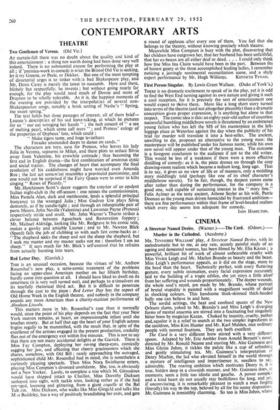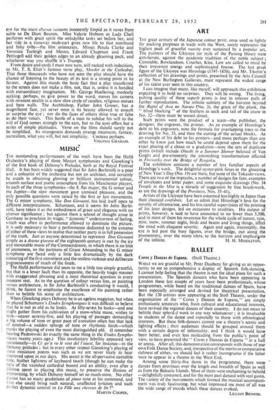CINEMA
A Streetcar Named Desire. (Warner.)—The Card. (Odeon.)-- Murder in the Cathedral. (Academy.) MR. TENNESSEE WILLIAMS' play, A Streetcar Named Desire, with its melodramatic but to me, at any rate, acutely painful study of an ageing and demented woman, has been filmed by Mr. Elia Kazan ; a powerful, brilliant bit of work of almost unbearable cruelty with Miss Vivien Leigh and Mr. Marlon Brando as beauty and the beast. Miss Leigh's performance appeals, as it did on the stage, more to the head than the heart. Technically perfect, with every fluttering gesture, every subtle intonation, every facial expression accurately laid to the building of a tragic edifice, she yet stays a little aloof from her suffering and wounds proportionately: The deeper wounds, the whole soul's recoil, are made by Mr. Brando, whose portrait of brutal stupidity- is painted with a magnificent wealth of detail in shocking colours. This handsome thick-skinned thick-headed bully one can believe in and hate.
The sordid settings, the heat and confined spaces of the New Orleans slums, yoked to Mr. Brando's and Miss Leigh's diverging forms of mental anaemia are stirred into a fascinating but singularly bitter brew by magician Kazan. Choked by insanity, cruelty, pathos ancLsqualor it is a relief to snatch at the two simpler ingredients in the cauldron, Miss Kim Hunter and Mr. Karl Malden, nice ordinary people with normal fixations. They are both excellent. The Card is a very different brew stirred with a very different spoon. Adapted by Mr. Eric Ambler from Arnold Bennett's novel, directed by Mr. Ronald Neame and starring Mr. Alec Guinness and Miss Glynis Johns, it tickles the palate like a cup of refreshing and gently stimulating tea. Mr. Guinness's interpretation of Dewy Machin, the lad who elevated himself in the world through a mixture of intelligence and impertinence is, needless to say, admirable. The roaring ambition which motivates Dewy is, it is true, hidden deep in a clownish manner, and Mr. Guinness does, at moments, seem a little too idiotic and gauche. A power complex and a kind heart do not usually stay bedfellows for long, and yet, if unconvincing, it is remarkably pleasant to watch a man forging (literally) his way tb the top, beloved by all for his sunny disposition. Mr. Guinness is irresistibly charming. So too is Miss Johns, whose eye for the main chance remains innocently limpid as it roves from sable to De Dion Bouton. Miss Valerie Hobson as Lady Chell performs with great spirit the unladylike tasks set before her, and her ride in a runaway mule-cart gives new life to that moribund and fishy tribe---:the film aristocrats. Misses Petula Clarke and Veronica Turleigh and Messrs. Edward Chapman and Frank Pettingell add their golden edges to an already gleaming pack, and whichever way you shuffle it's Trumps.
From desire and cards I must now turn, still racked with indecision, to Mr. T. S. Eliot's famous verse play, Murder in the Cathedral. That those thousands who have not seen the play should have the chance of listening to the beauty of its text is a strong point in its favour. Against this stands the basic fact that a play transferred to the screen does not make a film, not, that is, unless it is handled with extraordinary imagination. Mr. George Hoetiering, modestly seeking, perhaps, to give power to the word, moves his camera with reverent stealth in a slow slow circle of candles, religious statues and bare walls. The Archbishop, Father John Groser, has a magnificent face, yet never once is its beauty allowed to assault or surprise the eye ; nor do the faces of others shine true or false as do their voices. This battle of a man to subdue his will to the will of God comes strongly to the ears, but to the eyes offers but a series of simple platitudes. Verse on the films should surely not be simplified. Its strangeness demands strange treatment, fantisy, .surrealism, what you will, but not simplicity. Cocteau perhaps.
VIRGINIA GRAHAM.



































 Previous page
Previous page